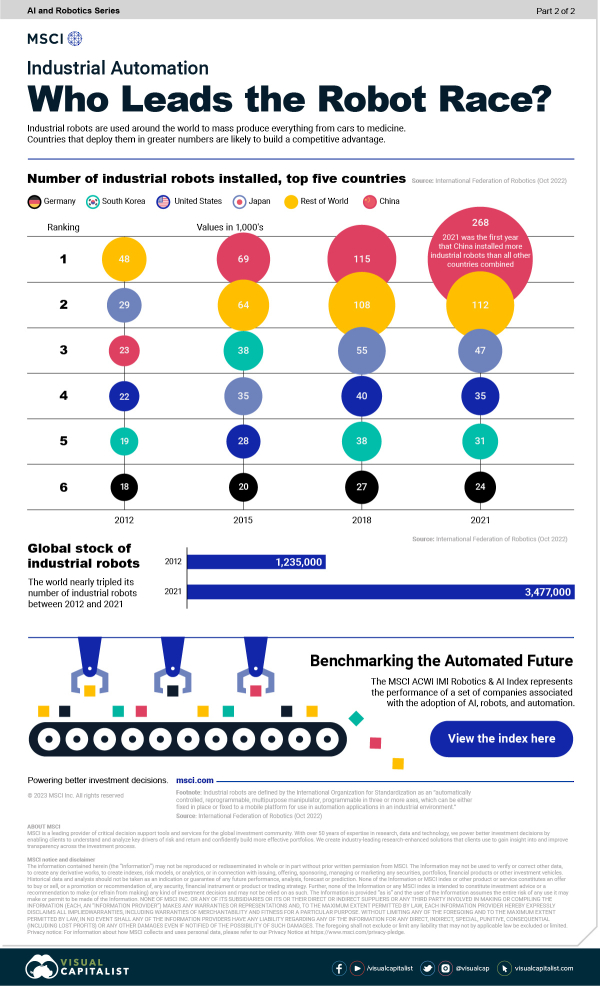We talk a lot about automation – but tend to focus on the less tangible robots. Meaning, we talk about algorithms and AI, quantum computing, and how entrepreneurs can benefit from these new technologies.
However, a significant segment of automation is industrial (and often robotic process automation). Henry Ford and the assembly line revolutionized the world when they took the time to make a car from over 12 hours to just over 90 minutes.
It's interesting to think about more classic automation, and how different it is today from 1913 … Of course, the level of machinery has grown exponentially, but so have the processes and the capabilities we expect. I flashback to Kanban and Toyota and what that did not only for the automobile industry … but for corporations and small businesses around the globe.
Who's Winning the Robot Race?

MSCI via visualcapitalist
Unsurprisingly, this is where China thrives.
In 2021, China installed more industrial robots than all other countries combined… Crazy.
Industrially, it's primarily automobiles and electronics that drive those numbers up. Japan also makes massive investments in those two industries.
Interestingly, America is more evenly distributed with metals, plastics, and food, each seeing over 10% allocation.
Something To Think About
One of the fears I often hear is that AI will take our jobs, and what do we do when that happens? Here are my thoughts on that from a blog post called, Will Robots Take Your Job?
New industries are also creating new jobs. With that said, recognize that people are increasingly resistant to doing the work we tend to automate. That is part of why it got automated in the first place. Another reason is that birth rates are dropping globally, and we always strive to do more with less.
Think about countries like Japan – which rely heavily on manufacturing … but are seeing their already small populations decline. What do they do when their plants sit empty due to labor shortages?
Or, what about agriculture? We've already seen an exodus of youth who don't want to be involved in farming due to the long hours and grueling work… How do you keep up with the production necessary to feed the world?
We often think about robotics as taking our jobs, but the reality underpinning today (and the paradigm that will drive the future) is that automation sustains industries.
When labor can't keep up with demand, robotics fills the gap, whether it occurs in manufacturing, agriculture, or medicine.
As robotics get more capable, it won't be long before that's robotic surgeons are a normal part of a hospital's medical suite.
The same is true for AI. It will supplement gaps in countless industries.
These technologies are coming to your industry. It's inevitable. If you fight it, you'll feel strife and stress about the changing workforce. If you get ahead of it, you'll find endless opportunities to pursue your passions. As society shifts, I hope we see an influx of entrepreneurs to help drive the next era of innovation.
What do you think will happen?
P.S. Do you get my weekly round-up of links and thoughts on AI, exponential technologies, markets, and other interesting stuff? Or my new AI-curated newsletter? I believe you'll find them useful and fun. Happy to add you or anyone else you want to get it. Click here for the sign-up link.

Leave a Reply